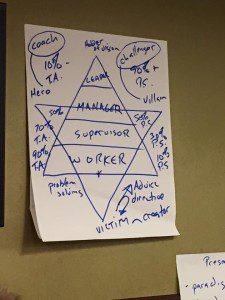
Getting Out of Your Comfort Zone
I remember it like it was yesterday. The date was January 2, 2002. I peered through the window of my airplane, taking in the sights
As a small business coach, I am asked for small business tips all the time. “Tip” is a code word for advice. I don’t give advice; me giving advice inherently would be bad advice. When faced with a decision, asking for and taking advice (see it’s meaning here) plants a seed that will grow and ultimately destroy your small business. Imagine, something as simple as taking advice from a fellow small business owner resulting in losing everything you have spent your life working for?
If you wish to avoid that, keep reading. Before you do, check out last weeks blog, so you are clear on what the word “decision” means when I use it.
In this week’s blog, I’ll describe what the drama triangle is and how it explains what truly occurs when you seek for and offer advise. I will coach you through some real-world applications (from my own experience) on how to empower yourself, ask the correct questions, leave the drama triangle, and enter the empowerment triangle after challenging you to think about how you use the phrase “advice” as well as when you ask for and provide it. I felt completely empowered in every area of my life when I applied this idea to my business, my life, my family, and my role as a man with a purpose. The same thing will happen to you. This is a fact, not advise or my view.

Most people seek guidance when they are faced with a difficulty, crisis, or opportunity. Asking someone else for their advice on what you ought to pick, implement, or do places the responsibility for resolving your issue on them. When they offer you advise, they take on the role of the savior, solving your situation. By the way, the villain who caused the issue is typically present. The drama triangle is the name for this situation. The basic idea is that nobody accepts ownership of or responsibility for the task of solving a problem. The problem must be fixed, and fixing it is a good purpose. However, the approach breeds drama, lack of accountability, and a vicious loop regardless of the quality of the advise.
Let me share an example. As a small business coach, I work weekly with CEOs and small business leaders. I was on a call with a CEO when he asked me “what I thought” about the comp plan for his sales team. My initial reaction is to answer his question, that’s what I do, I am the ‘fix your problem/answer guy’, right? Wrong, I am a coach, not an advice giver. Fixing my clients problem makes me the hero and him the victim. The villain is this evil broken comp plan that is wrecking his business.
My opinion of his compensation structure is irrelevant. It is not my business, my compensation scheme, or my sales manager. It is my duty to motivate and excite my client to decide what the real problem is (which by the way, had nothing to do with his comp plan). Even if the comp plan was the real problem, I have no business opining on something that was never really mine to begin with.
I challenged my client to stop asking questions about the comp plan, and tell me why that question matters anyway. As we discussed this, I reflected some of my clients language back to him on our Skype call. I basically asked a question, he gave me feedback, and I shared his language back to him. I typed his responses word for word on our Skype chat. I asked, ‘Why does the comp plan matter?’ Then I asked, ‘Can I share an experience with you?’ Since I have experience with comp plans, not that it matters in this case, as well as what the real issue was (his behavioral and language patterns and programming), this makes me relevant to speak into his life. Since he pays me a boat load of money to coach him, I would be doing a great disservice to him if I did anything other than coach him.
A breakthrough occurred during an intense, emotionally charged, and difficult exchange. The epiphany concerned what he as a man truly feels to be true about his value to the world, his family, his business, and community. The early issues he sought guidance on were really symptoms of a more serious illness: a pervasive false confidence in his own value. I would have done him a lot of harm if I had addressed his comp plan issue, hung up, taken his money, and then reveled in my heroics. He hung up the phone, though, fired up and eager to go out and win again.

Remember this:
Decide right now if you are ever again going to ask for advice and/or give advice? Remember last weeks blog. Draw a line in the sand. Make a decision, right now. What did you decide? What does this decision look like moving forward in your identity as a man/woman, your life, your family and your business. Share your thoughts below…………………………………………
It doesn’t matter what you think! Share your experience instead. If you are not getting caffeinated with me on a weekly basis, click the cup of coffee above to do so.


I remember it like it was yesterday. The date was January 2, 2002. I peered through the window of my airplane, taking in the sights

One of the most magical moments of the Hike of a Lifetime on the Camino de Santiago was the fact that we completely unplugged from

When I set off on the Hike of a Lifetime on the Camino de Santiago, I never thought one of the lessons I would learn
Copyright © 2022 All Rights Reserved | Website Designed By Imprint Digital